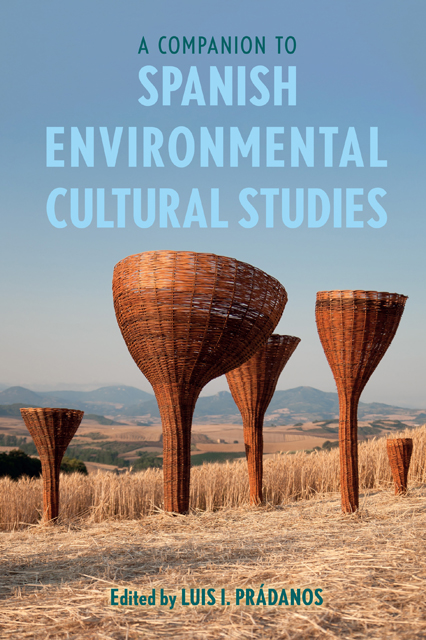Book contents
- Frontmatter
- Contents
- List of Illustrations
- List of Contributors
- Note on the Translations
- Acknowledgements
- Introduction: Spanish Environmental Cultural Studies
- Part I Environmental Cultural History and Political Ecology
- Part II Water and Power
- Part III Ecologies of Memory and Extractivism
- Part IV Animal Studies and Multispecies Ethnographies
- Part V Food Studies and Exploitative Ecologies
- Part VI Ecofeminism
- Part VII (Neo)Colonial and Racialized Ecologies
- Part VIII Tourism and the Environmental Imagination
- Part IX Eco-Mediation and Representation
- Part X Trash and Discard Studies
- Bibliography
- Index
12 - Spain’s Gastronomy: Capitalism and Reproductive Labor
Published online by Cambridge University Press: 08 June 2023
- Frontmatter
- Contents
- List of Illustrations
- List of Contributors
- Note on the Translations
- Acknowledgements
- Introduction: Spanish Environmental Cultural Studies
- Part I Environmental Cultural History and Political Ecology
- Part II Water and Power
- Part III Ecologies of Memory and Extractivism
- Part IV Animal Studies and Multispecies Ethnographies
- Part V Food Studies and Exploitative Ecologies
- Part VI Ecofeminism
- Part VII (Neo)Colonial and Racialized Ecologies
- Part VIII Tourism and the Environmental Imagination
- Part IX Eco-Mediation and Representation
- Part X Trash and Discard Studies
- Bibliography
- Index
Summary
Though numerous academic fields – from anthropology and archaeology to history, economics, and political science – have long been interested in the cultures of food, “food cultural studies” is a recent phenomenon. It was not until the 2004 volume Food and Cultural Studies that the intersections of the cultural studies research on culture-as-power and power-as-culture, on the one hand, and the food studies exploration of foodstuffs and foodways, on the other, started to receive the theoretical attention that they deserve. Going beyond the examination of the food systems themselves, food cultural studies uses the knowledge of these systems to glean insights into the gender, mobility, and power dynamics behind the production, distribution, preparation, consumption, and representation of food and its sources. With the current growing awareness of the mutual impact of food and nature in the Anthropocene, opening food cultural studies to environmental concerns is a logical next step.
Such an analysis would begin by tracing the environmental consequences of the food/power setup to provide a new language for questioning the impact of food on land use, the allocation of resources, and climate change. Yet, as a part of cultural studies, this questioning would also focus on the interdependence between environmentalism, power, and the cultures of food. Drawing on the work on the environmental economy of capitalism – a system of production that changes the nature of agricultural labor and applies extractivist practices to promote the foodscapes where capital can freely flow – environmental food cultural studies incorporates the idea of the Capitalocene, a distinct epoch during which nature becomes not just a source of sustenance but also the raw material, the byproduct, and the residue of the capitalist production cycle. Environmental food cultural studies traces the processes through which premodern practices and discourses related to food begin to change in order to reflect the interests of economic growth, thus showing not only the modernization of food cultures themselves but also the ways in which these cultures reveal the social effects of capitalism. Ultimately, environmentally-informed food cultural studies views the continuum of actions and representations concerning what foods are made of all the way to how they are thought of as a force that both shapes and reflects the environment.
- Type
- Chapter
- Information
- A Companion to Spanish Environmental Cultural Studies , pp. 135 - 145Publisher: Boydell & BrewerPrint publication year: 2023
- 1
- Cited by



